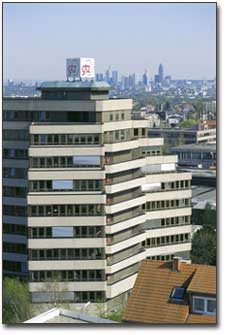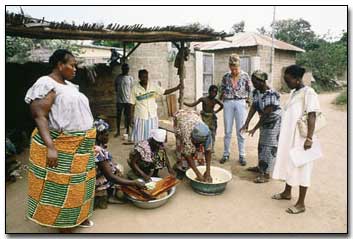|
|||||||||||||
GTZDeutsche Gesellschaft für Technische ZusammenarbeitGerman Agency for Technical Cooperation |
 |
||||||||||||
|
|
|||||||||||||
|
Type
|
Government agency providing technical assistance with limited capital funding throughout the major regions of the world.
|
||||||||||||
|
Brief Overview
|
The government-owned GTZ operates in the field of technical cooperation. Some 1,600 German field staff members work with 8,590 locally contracted personnel, and another 800 “integrated experts” are placed with employers in partner countries. Currently, there are 2,800 projects in 142 countries receiving administrative and professional assistance from GTZ Head Office in Eschborn and more than 60 GTZ Offices in partner countries. Experts are responsible for cooperation with individual countries, to ensure that the technical solutions and management methods used in the projects match the sociocultural and economic conditions of the partner countries. Consulting firms, specialist institutions and universities are also used as partners for projects where expertise on specialized issues is needed.
|
||||||||||||
|
Contact Information
|
website: http://www.gtz.de/
address: Deutsche Gesellschaft fur Technische Zusammenarbeit – GTZ Dag-Hammarskjöld-Weg 1 – 5 Postfach 51 80 65728 Eschborn 1 Germany telephone: (+49) 6196 79 0 fax: (+49) 6196 79 11 15 |
||||||||||||

GTZ Headquarters, Eschborn. |
|||||||||||||
|
|
|||||||||||||
|
Stated Goals
|
To raise people’s capabilities and transfer knowledge and skills to more than four continents.
|
||||||||||||
|
Regions of Work
|
Africa, Asia, and Latin America
|
||||||||||||
|
Areas of Work
|
GTZ works in 30 development activity areas, some of which are listed below:
1. Water, waste management, and resource conservation 2. Education and science 3. Multi-sectoral urban and rural development 4. Health, population, and nutrition 5. Agro-policies, agricultural service systems 6. Energy and transport 7. Financial systems and the promotion of small scale enterprises 8. Environmental protection |
||||||||||||
|
Methods
|
1. Technical Cooperation: 2. Services for International Financing Organizations: |
||||||||||||
|
Examples of Upgrading Project
|
Early projects of GTZ were comprehensive integrated projects in the Dominican Republic, “El Caliche”; Zambia, “Kalingalinga”; Brazil in Belo Horizonte; and Egypt, “Nasriya” in Assuan. In Kenya, the GTZ project in Voi has become a model with its innovative community land trust which links traditional tenure forms and contemporary demands. All projects are highly participatory ranging from joint decision-making to direct labor inputs. GTZ has also undertaken innovative upgrading of historical cities. A landmark project was carried out in Bhaktapur, Nepal, and the principles are now being replicated in the neighboring town of Petan. Current projects include a city-wide initiative in Dakkar, Senegal “Habitat Spontanee/Pikine,” and large-scale projects in Brazil: Porto Alegre, Fortaleza, Recife, Belo Horizonte.
|
||||||||||||
|
Project Selection Process
|
Projects are submitted to the German Federal Government by governments of partner countries through official channels. If the objectives and focus of proposals are in line with German development policy, the Federal Government passes on the proposals for technical cooperation to the GTZ. Objectives of and focuses for cooperation are concluded through a dialogue with partner governments, which usually takes place once a year. The German Federal Ministry for Economic Cooperation and Development (BMZ) is responsible for development policy, and generally commissions GTZ to devise German contributions and provide the necessary services.
|
||||||||||||

GTZ is heavily involved in hands-on field work. |
|||||||||||||
|
|||||||||||||
